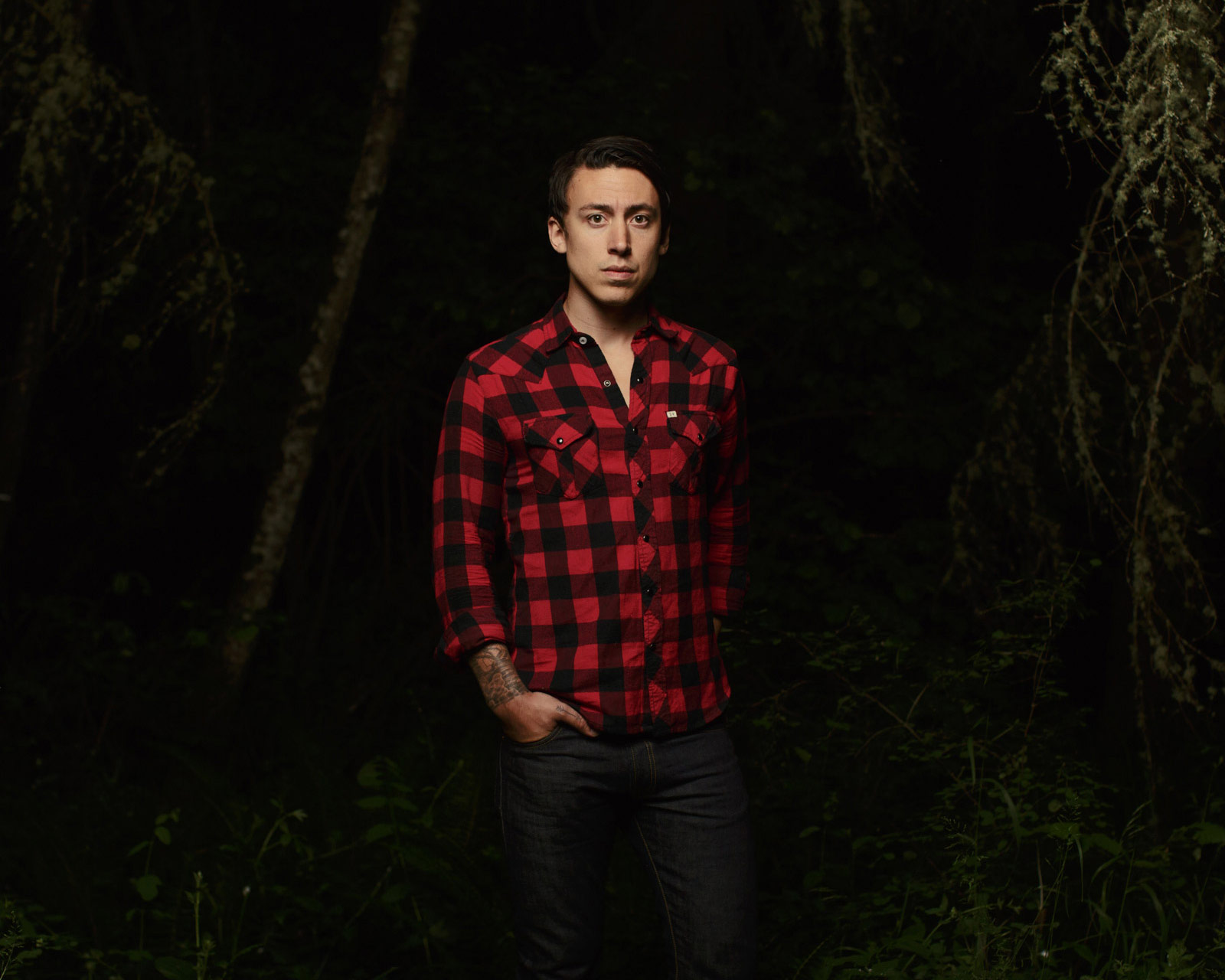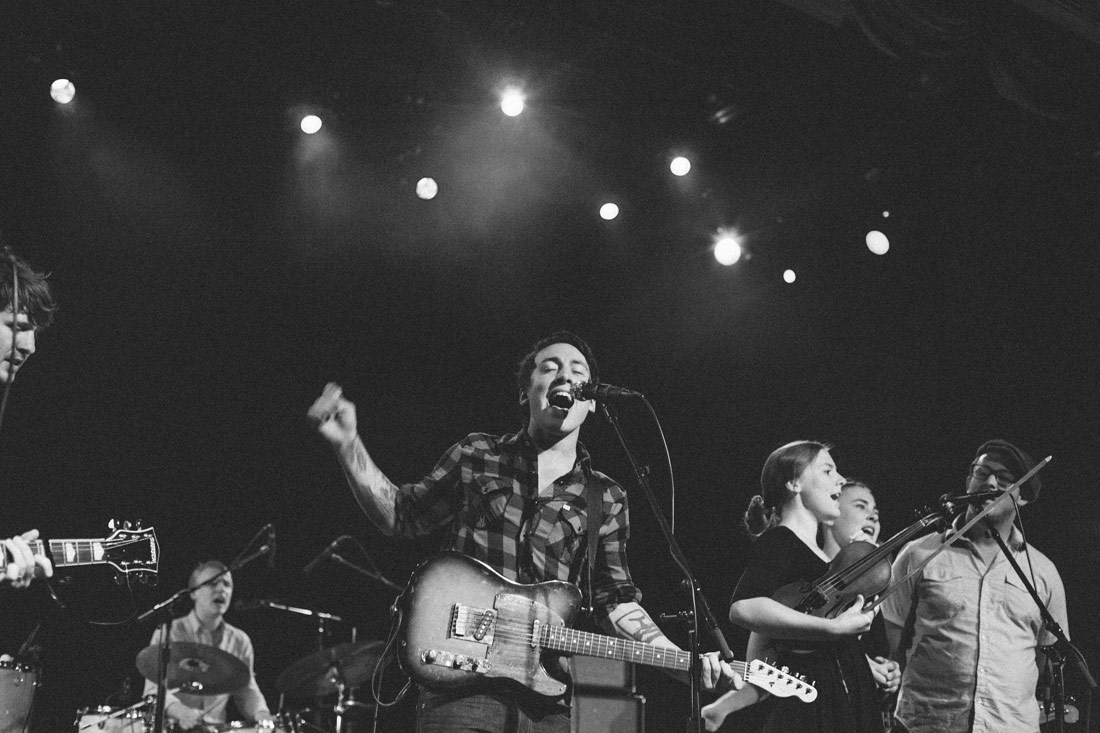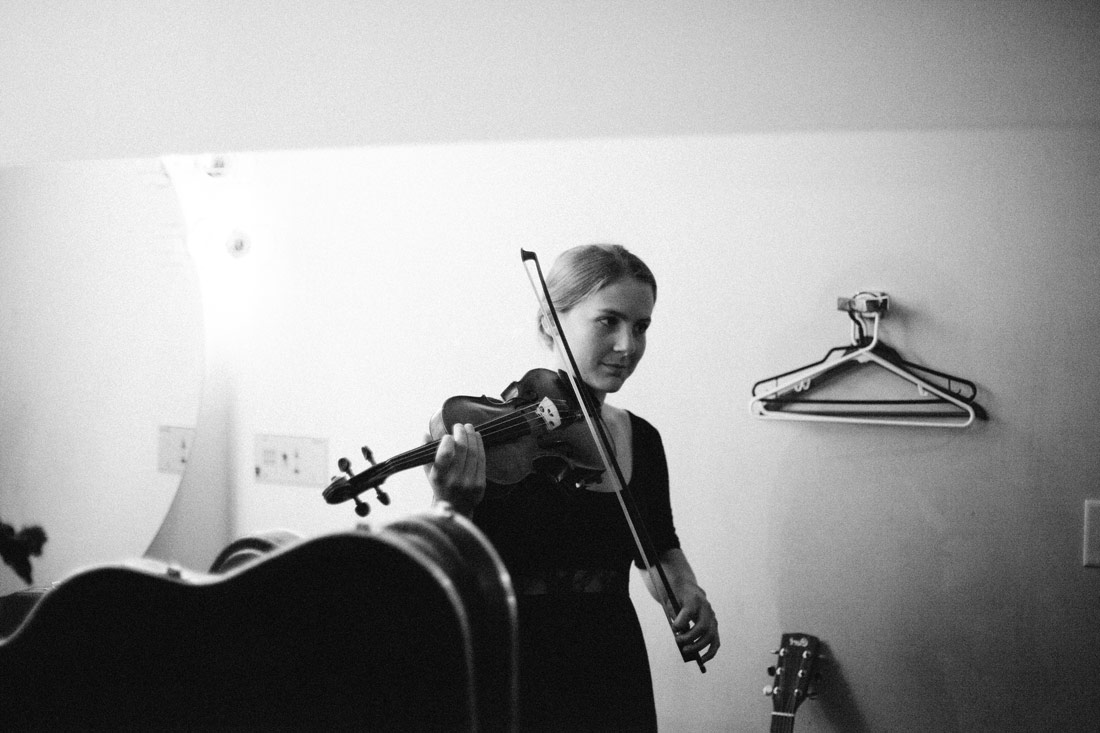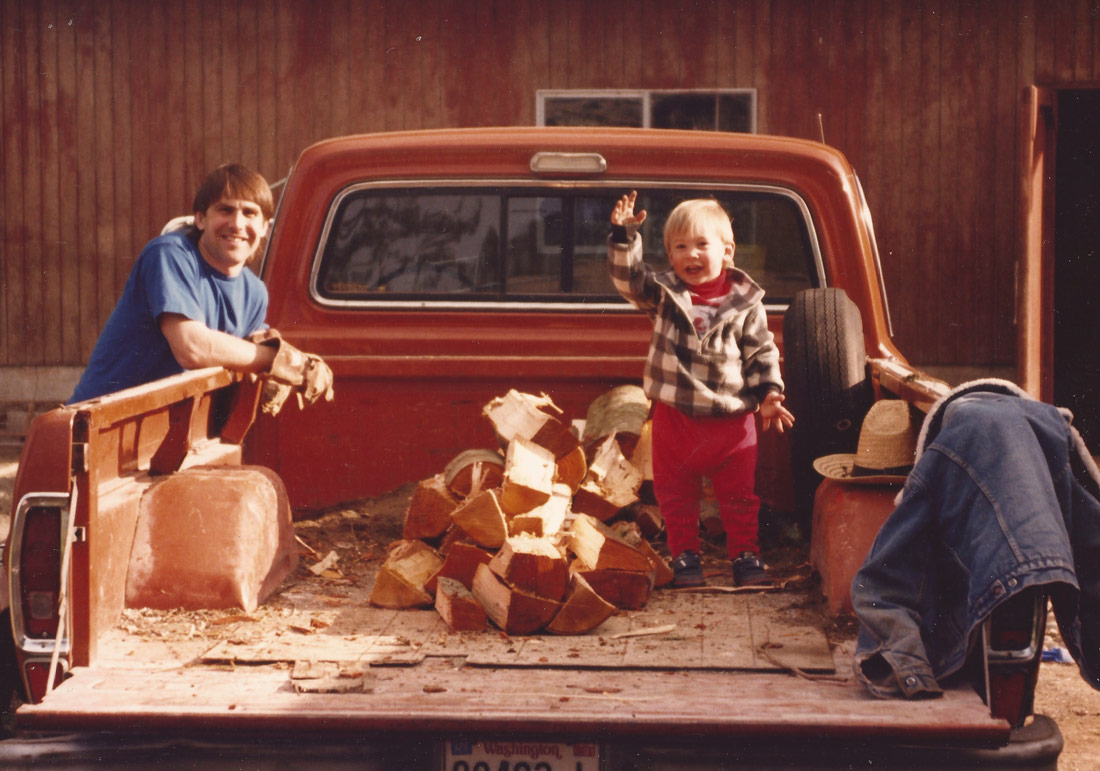
- Interview by Tina Essmaker February 25, 2014
- Photo by Ben Blood
Noah Gundersen
- musician
- songwriter
Noah Gundersen is a Seattle-based musician who grew up in Centralia, Washington, where he first learned to play piano and later taught himself guitar. By 16, he was playing in local cafes, joined by his sister, Abby, who sang harmony and played violin. In 2008, Noah and Abby formed The Courage, which they played under until 2011 when Noah focused his attention on a career as a singer-songwriter. Noah’s first full-length album, Ledges, debuted in February 2014.
Interview
Describe your path to becoming a musician.
I grew up in the small town of Centralia, WA, and I had a very musical family. As a kid, I took piano lessons, and my sister, Abby, studied violin. She and I were homeschooled, like most of our family, and that allowed us to spend a lot of time on music. When I was 13, I started teaching myself to play guitar and began writing songs—they were all terrible songs, but having that time and space to make music was really valuable. Abby and I started playing music together at that same time and our dad helped us record our first album on an old tape machine. We played our first show at a local coffee shop when I was 15, and we’ve worked our way from there.
It’s been a long, slow climb. I’ve resented it at times, but at this point in my life and career, I’m grateful for that pace. It’s allowed me to build a strong foundation and take time to experiment. Through trial and error, Abby and I have been able to figure out what works without the consequences that might have come had there been more of a spotlight on us.
When we started, Abby and I formed a band called The Courage, which we played with for a while before breaking it up in 2010. We’ve put out a few EPs, including Family, and this year I’m putting out my first full-length record called Ledges.
Was there an “aha” moment when you decided to pursue music as a profession?
Near the end of high school I started a program here in Washington called Running Start, which allowed me to finish high school while doing my first two years of community college. Although I finished the program, I never really wanted to go to college. I had an indecisive moment, like many do when they graduate and feel unsure about what they want to do. I considered studying music production at the Art Institute of Seattle, but deep down I knew that I wanted to play music. Ever since I was a kid, that’s all I ever really wanted to do in life.
At one point, someone told me that everyone who makes a backup plan usually ends up doing it instead of following their dreams. I took that to heart, and it made me realize that if I was going to be a musician, then I had to really do it. I thought, “I’m not going to plan for failure, because I’m not going to fail.”
Maybe I was naive, blind, or stupid enough to believe that I could actually do it, but those feelings allowed me to not be fearful. Ultimately, at 18, what do you have to lose? Most people end up going to college—many do that for no real reason. Others go because it’s what they think they’re supposed to do or it’s what others have told them to do or they think it’s where they’ll figure things out. A lot of people do figure it out, which is great, but many end up with a lifetime of staggering debt, and then they do have something to lose. I was in a position to quit my job, live out of my car or on friends’ couches, and play random shows for cash because I had nothing to lose.
The first tour I ever did was playing in random coffee shops. A dude on Myspace named Dylan Morrison hit me up and asked me if I wanted to go on a tour with him, (laughing) and I said, “That sounds great!” He and I and my friend, Karli Fairbanks, spent the next week driving around Washington, playing in tiny coffee shops. There weren’t many people to play for, but it was still exciting; it felt like some motion, and motion is better than nothing. Through chance and circumstance, we met other musicians who started having us on as openers.
So much of my career has been about putting myself out into the world as much as possible. I try to be an easy person to work with, and I try to make good art, but it’s funny: so many things are just complete chance. You can work so hard to try and get all your ducks in a row, but so much of it just randomly happens. But in order for things to randomly happen, you have to put yourself out into the world.
Were you also working a day job to support yourself?
When I was growing up, I worked construction with my dad for a long time. Then I took a job at Starbucks for a couple years. When I was 18, I quit Starbucks to play music for a living and went on a three-week tour with some friends while crashing at people’s houses. I got myself into some debt during that time, but it was nothing compared to the debt I would have gotten into by going to college. I don’t mean to sound like I’m dissing college by any means: college is really valuable for people who know what they want to do, or those whose parents are paying for it, but I was never in that position.
A couple years later, on the way home from a long tour with The Courage, I decided to move up to Seattle because I knew that if I was going to keep pursuing music, I had to be in a place with some kind of music community. Once I moved to Seattle, I lived with my then-band member in his brother’s garage in the middle of winter. The first job I could get was through a fan who offered me a job at a tanning salon. (laughing)
See, this is the good stuff.
Yeah, I never thought I’d do anything like that, but I was determined to be in Seattle and needed to pay rent. Three months later, a friend saved me by giving me a job in a guitar store. I worked there for two years while I toured, and then I eventually got one of my songs featured on a TV show.

“…someone told me that everyone who makes a backup plan usually ends up doing it instead of following their dreams. I took that to heart, and it made me realize that if I was going to be a musician, then I had to really do it. I thought, ‘I’m not going to plan for failure, because I’m not going to fail.’”
Yeah, that’s how we first heard your music—on Sons of Anarchy.
That changed a lot of things, but it was a funny, random circumstance. I like to see music as a career of many small steps that lead to big steps, and getting one of my songs on Sons of Anarchy was one of those big steps. It brought us more attention and allowed me to quit my job at the guitar shop. That was about two years ago.
I read that the Sons of Anarchy creator, Kurt Sutter, randomly came across your music. Do you know?
Yeah, that’s how it happened as far as I know. I’ve never personally asked him about it, but no one was pushing our music to his show.
Was it weird to hear your music on a TV show?
Yes. I later realized how lucky I was to have a song on that show, because they really give a shit about how a track fits in with a scene: it’s not just music laid on top of a montage. I was blown away by how well the lyrics fit—I got chills when I watched it.
Have you had any mentors along the way?
Yes. I wouldn’t be where I am today without the help of some amazing people.
Daniel Mendez, the producer who worked on my EPs, Family and Saints & Liars, has taught me a lot. He was one of the first people outside of my family and friends who really believed in me. We ended up parting ways, but his support, mentorship, wisdom, and knowledge was a really big part of me believing in myself when I was starting out. Back then, I had wanted to start a rock band, but he affirmed something in me by saying, “Songwriting is what you’re good at. Pursue that.” I still love rock music, and it’s something I still experiment with, but it was important to have someone direct my energy into a specific focus.
Another mentor of mine is singer-songwriter David Bazan. He came into the guitar store I worked at in Seattle and I asked if I could grab a beer with him. (laughing) He was nice enough to say yes, and we’ve since met up occasionally and played a couple shows together. He’s an incredibly strong person with strong ideals, and I have learned a lot from him.
There’s also a friend of mine in Seattle named Billy Stapleton. He’s an old blues guitar player, and he and I will occasionally meet up for lunch to talk. He’s been like a grandfather figure to me.
Was there a point when you decided to take a big risk to move forward?
It may sound pretentious, but I’ve never really considered what I’ve done to be a risk. There’s never been a moment when I thought, “Man, if I screw this up, I’m going to lose everything.” It’s always just been one foot in front of the other.
I guess moving to Seattle was a bit of a risk, but I knew I could always move back to Centralia if it didn’t work. I think I believed that things would work out as long as I was diligent and kept pursuing what I wanted to do. Some of that comes from having really supportive people around me, but I’ve also always had an end goal in mind. That’s what has kept me going.

Are your friends and family supportive of you being a professional musician?
Yes, very much so. I was lucky to have supportive parents—a lot of people don’t have that luxury. They have always encouraged my siblings and I to look at different possibilities and options, but, ultimately, they have encouraged us to do what we want.
I’m also lucky that I get to play music with several members of my family. Abby still plays with me, and she’s a huge part of what I do. My little brother, Jonathan, plays drums when Abby and I go out with a full band, and I play guitar in Le Wrens, the band that Jonathan and my sister, Elizabeth, have. I have a healthy relationship with my family, and I’m lucky that I get to do what I love with them.
Do you feel a responsibility to contribute to something bigger than yourself?
Yes, to a degree. I don’t feel like I’ve ever had a message: I’ve never set out to write a political song or a protest song, or tried to spread a message about anything. I just say what I’m thinking, make the music I love, and I’m grateful that people like it.
On the other hand, I’ve been able to see firsthand the positive effect that music can have. I have gotten emails from people saying things like, “Your music saved my life.” That’s really powerful and heavy for me, and knowing that makes this all the more worthwhile when it’s hard. It’s nice to know that I can have that kind of effect on the lives of people who I don’t know and may never meet.
When I was a kid, I sometimes struggled with depression and feelings of loneliness. Hearing musicians who I liked talk about those things made me feel like I wasn’t alone, like there was someone out there with the same feelings, saying what I couldn’t say. Actually, it’s kind of funny—David Bazan’s band, Pedro the Lion, was one of those bands, and I’m grateful to be able to call him a friend now. I listened to Dashboard Confessional, too, and now I’m able to call Chris Carrabba a friend.
The older I get, and the more I interact with people, the more I realize that we’re not all that different. These days, I might not listen to an artist and think, “He’s really saying what I’m trying to say,” but I had those feelings when I was a kid, and it reminds me that what I do is valuable to people.
Are you creatively satisfied?
Sometimes, when I’m busy. I’ve struggled a lot with creative satisfaction. I’ve struggled with being able to rest and not feel guilty for not writing. I’ve only recently come to a place where I’m okay with the fact that I’m not writing or working at my craft every day. I’ve also started producing records for other people, which has been a great creative outlet for me; it’s been a really wonderful learning process, too. I’ve also played in some other bands and have tried to get myself out of my own narcissistic headspace as a songwriter.
Being creatively fulfilled is such a strange thing, but I do feel fulfilled as a human being right now: I have a job that I love, I have a wonderful girlfriend, and I have a home in Seattle by a lake. I feel fulfilled and happy in a way that I haven’t felt in a long time, and I think part of that comes from making the decision to choose love as an action.
Something that struck me is that when I do well as a singer-songwriter, it means that I, as a person, am doing well. When your job is you, that’s great, but you can very easily fall into the trap of being the center of your own universe and focusing everything on yourself all the time. It can be very subconscious, but it’s there.
On a recent break from touring, I started asking myself some big, existential questions that I hadn’t asked myself before, for whatever reason. If we’re all really alone in the universe—if there is nothing out there that is bigger than us—then what has value? If that is true, then the only thing that we can do that really has value is to love and know someone else intimately, therefore making ourselves and someone else not alone. I’m still really excited about what I’m doing and what’s happening in my career, but I’ve transitioned to trying to choose the action of love outside of the cliché that we all hear constantly. I get so fucking tired of hearing, “Love is all you need,” or, “Love is the answer.” What does that fucking mean to anyone? I wanted to break it down into practical terms.
I am a person first and an artist second, and I don’t think it should be the other way around. I’ve lived the other way around, and it’s not emotionally healthy for me. We’re given these images of artists—Bob Dylan is a quintessential example—as being crazy and self-destructive, but also geniuses. I love Dylan, but I don’t want to be Dylan: I want to be a sincere version of myself and what I make. I’ve realized that, in order to make art that is true to myself, I have to be okay with myself first. That means doing very un-rockstar things like exercising every day, not drinking as much, and eating healthy. (laughing) Those aren’t cool things, but I’m becoming okay with that.
It’s tough when you view yourself and your art as one and the same. If someone judges or embraces what you put out, it’s like they’re judging or embracing you as a person. It’s hard to make that separation, and it becomes easy for you to become your work.
Yeah, and you begin to take it for granted. You think, “People like me!” But they don’t like you; they like what you make. That’s great, but it’s important to separate yourself from that and not take for granted the actual love you have in your life, because that’s independent from what you make. As much as I’m grateful for the people who love what I make, the people who love me as a person despite what I make are the people who are really important to me.
Is there anything you’d like to work on in the next 5 to 10 years?
I’d love to play with other bands, produce other people’s records, and tour more. I enjoy being busy and having my hands in different things. Ultimately, I want to keep experimenting, learning, growing, and taking small steps. I want to run a marathon, not a sprint—figuratively, not literally. (laughing)
Well, you were talking about getting healthy. (laughing)
Actually, now that I’ve said that, I do have a small goal of maybe running a half marathon at some point in my life. In general, though, I never want to settle, but I still want to be comfortable and fulfilled. That is a balancing act: in order to stay driven, you have to realize that you never arrive, but you also have to be content with yourself as a person. I want to feel good about myself, the choices I make, and the people around me.
What advice would you give to a young person starting out?
Make as much art as you can. I’ve always been someone who learns through trial and error, so I would tell people to try different things—but make a lot of art. Make a lot of garbage that you’re going to throw away later, and keep doing it. Put yourself out into the world and play anywhere you can until you have some traction. Don’t compare yourself to other people, but find people who you respect and ask for advice. Some of it will stick, and some of it won’t; some of it is good advice, and some of it’s bad, but ask anyway.
And be good to people. Being an asshole doesn’t make you a cool musician—it just makes you an asshole.
You’re based in Seattle. How does living there impact your creativity?
I don’t know. I’m not sure if living in Seattle has directly affected my creativity because I haven’t really lived anywhere else besides Centralia. I’ve spent a lot of time in other places, but I’ve never lived anywhere else. I love living here, but I think having a home and being settled in a place where I have a quiet space to write affects my creativity more than Seattle itself. I live in South Seattle, which is a little more removed from the city, so I have a quiet neighborhood where I’m able to decompress and think after tours.
Is it important to you to be a part of a creative community of people?
Not so much. It’s important to have people around who inspire and support me, and I definitely have those people, but they are spread out around the country. I have some good friends in Seattle, but I wouldn’t say that I’m a part of a strong music community here. I feel like my community is much more spread out throughout the country. Some of my best friends live in Nashville, Texas, LA, and New York: that’s my community, but it’s much more widespread than where I live.
What does a typical day look like for you?
Being home is very different from touring. For example, today I woke up, got a haircut, and bought some jeans. (laughing) Then I came home, checked my email, and had this interview with you. I might go grocery shopping later or get a drink and hang out with my girlfriend. Tomorrow night I’m going to go see a friend play a show and celebrate another friend’s birthday. I keep it pretty chill when I’m home.
It’s a whole different life on the road. When I’m touring, I wake up, try to exercise, eat, drive, drink, play, drink, sleep, and repeat.
Those are two strange, dichotomous lifestyles that I’m trying to find a way to balance. I love meeting people and getting to play music, but it can be taxing. I notice how my body feels a lot more because of how it affects me mentally. I’m determined to make the road work, though. I like being sharp and staying healthy, so I’m slowly learning how to do that when I’m on tour.
What music are you listening to right now?
I’ve been listening to Night Beds a lot, and I just found a band called Seekae. I’ve also been playing a lot of old Billy Joel, Chet Baker, and Active Child recently. I’m really into Drake’s new album, Nothing Was the Same, and the new Boards of Canada record, Tomorrow’s Harvest. There’s an LA-based band called Kisses that I really like, too.
Do you have any favorite TV shows or movies?
Mad Men is probably my favorite TV show, followed by Game of Thrones, M.A.S.H., and Breaking Bad.
For movies, I thought Her was amazing. It was a weird year because there were a lot of movies that I was excited to see, like American Hustle and Inside Llewyn Davis, but I didn’t really care for them. The Boondock Saints is one of my all-time favorites. I like most things by Terrence Malick. I also like Fight Club and, of course, Star Wars.
Do you have any favorite books?
I’ve read East of Eden twice, and I really enjoyed Ender’s Game. I also like most of David James Duncan’s books, like The Brothers K and The River Why. I just started a fantasy series called The Wheel of Time by Robert Jordan, which is totally nerdy, but great. (laughing)
What is your favorite food?
I can pretty much always eat pizza. (laughing) Pizza and burgers—I’m really selling myself as a healthy person, huh? The diet of a 13-year-old.
(both laughing)
What kind of legacy do you hope to leave?
One of integrity, honesty, generosity, and grace. Those are four really valuable ideals to me, both musically and personally. I want people to think of me as someone who treated them fairly, someone who was honest, gracious, and generous with them. I’ve been given so much that I don’t deserve, and I want to give back to the people in my life.

“I want people to think of me as someone who treated them fairly, someone who was honest, gracious, and generous with them. I’ve been given so much that I don’t deserve, and I want to give back to the people in my life.”
